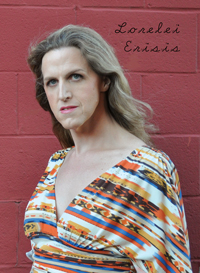By: Lorelei Erisis*/TRT Columnist—
Hi Steve!
Your email was pretty similar to a lot of other queries I receive, and it covered a number of topics that people often ask about. Therefore, I thought it would be nice to return to form a bit and answer you with an old fashioned Q&A column. I’ve broken up your questions a bit, so let’s see if I can answer them without turning this into a book. I do seem to have a penchant for verbosity.
Q: As far as your journey, is there a specific event that you consider the “beginning” of your transition—like, say, when a psychiatrist determined that, yes, you do have gender dysphoria (or whatever they’re calling it now), or when you took your first dose of estrogen?
A: Well, this is tricky. Technically, we are all always transitioning all the time. Birth is the start and death the end, roughly, depending on rates of decomposition and/or religious beliefs. Seriously though, there was no solid beginning, more like many beginnings. There was when I decided I really was trans and needed to transition. There was when I began HRT (Hormone Replacement Therapy). There was when I began living part-time and then full-time as a woman. There was when I came out to my family and friends. You get the gist. [pullquote]I would also note, just briefly, that the usually preferred term is “cisgender women.” “Genetic women” is offensive to some and not especially accurate for reasons I will have to leave for another column.[/pullquote]
In point of fact, though I went to individual and group therapy because I felt I was making a big choice and I wanted to talk it through and give myself a support structure, I resisted being given a diagnosis of “gender dysphoria.” I felt essentially that I wasn’t “crazy.” I knew what was wrong and the steps to fix it, and I didn’t want the legal, social or economic baggage that comes with being diagnosed with a mental illness. I actually began HRT with a doctor (who was also a trans woman) who was willing to start me on what’s called an “informed consent” model. Basically, I signed some papers saying, yes, I knew what I was doing, knew the risks and was of sound mind and body.
Q: And is it estrogen that’s given to start the transition?
A: It depends on what type of transition you mean. Not all trans people choose to or can safely transition physically and/or surgically. I chose to transition physically myself through HRT, but haven’t had any surgeries other than laser hair removal on my face. This is at least in part due to the expense of surgeries including Gender Reassignment Surgery (there are a number of other names in use for this, but forgive me if I skip by them in an attempt to stay on point and under my word count).
As for HRT, yes, for trans women it usually includes some form of synthetic estrogen, in many cases, Estradiol. Also, a testosterone blocker is often introduced. I take Spironolactone, though there are others that are fairly common. Some folks also take a form of progesterone. There is a great deal of debate on the usefulness of this. I don’t take it myself.
Q: How long does it take before you … how do I ask this tactfully … before you start to notice the effects the medicine is supposed to achieve, like the softening of your skin, breast development?
A: I’ll likely be on some form of HRT for the rest of my life. Technically though, the major effects are similar to going through puberty a second time, with roughly the same timeline of effectiveness. My skin started softening right away. My breasts began growing soon after, with noticeable growth around the two to three year mark.
Q: Wow, I sound like I’m getting way too personal!
A: Yes, but it’s cool. You’ve been polite and this is technically what I do. I’m happy to answer questions like this at least in part so other trans people don’t have to. Keep that in mind please. I’m more than happy to answer these questions as a public figure and advice columnist and frankly a woman with few filters, but they might not be appropriate to ask other trans people.
Q: I read somewhere that the female hormones administered are given for three weeks, with a week off, so to speak, to try to be as close as possible to the cycle that genetic women experience.
A: There are many different ways that HRT is administered and prescribed. As new research emerges, the methods often change. You could ask 10 different trans women with five different doctors and they’d each give you a different answer for how they and their doctor choose to administer their HRT regimen.
The way I do it is close enough to what passes for current common practice though. I’ve been on HRT for about eight years, so my hormone levels are pretty stabilized. I started on Estradiol and Spironolactone pills daily. Now, I give myself a weekly injection of Estradiol and take a slightly smaller dose of Spiro daily.
Trans women who take progesterone do so because there is some belief that it causes the body to more closely mimic a cisgender woman’s natural cycle, among other purported effects. I would also note, just briefly, that the usually preferred term is “cisgender women.” “Genetic women” is offensive to some and not especially accurate for reasons I will have to leave for another column.
Q: Does that cause what’s labeled PMS? Is it like going through a second puberty to go through the transition?
A: Kinda? I definitely get a little irritable once a week before I take my Estradiol shot. I get really aggro and emotional if I forget for a day or two, or if there’s some trouble with running out of my prescription, which has happened, but it clears up pretty quickly once I’m back on track. And yes, it is like a second puberty, right down to the occasional teenage girl meltdown. It’s oh so charming, especially when you think, “Hey, I’m an adult in control of my emotions.” Ha! And then you cry at commercials.
Hope these answers help. Thanks for your questions and for being a loyal reader!
Slainte!
*Lorelei Erisis is an actor, activist, adventurer, and pageant queen. Send your questions about trans issues, gender and sexuality to her at askatranswoman@gmail.com.
[To read a copy of The Rainbow Times’ March, 2015 issue in .pdf click here; via ISSUU, click here.]








